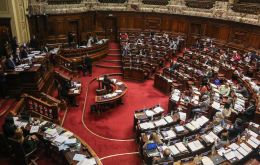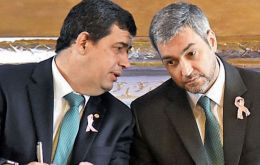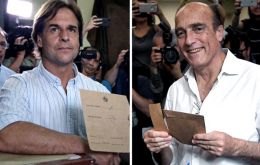MercoPress. South Atlantic News Agency
Tag: Colorado party
-
Friday, October 7th 2022 - 10:57 UTC
Uruguay's Lower House passes euthanasia bill

Uruguay's Lower House Thursday passed a bill legalizing euthanasia with 57 votes out of 96. The project now goes to the Senate for further Parliamentarian treatment.
-
Thursday, April 28th 2022 - 09:36 UTC
Paraguayan left picks presidential candidate

As the ruling Colorado Party still needs to work out the differences between incumbent President Mario Abdo Benítez and his predecessor Horacio Cartés who both endorse separate candidates, Paraguay's left has already picked their nominee - former Health Minister María Esperanza Martínez (2008-2012).
-
Saturday, September 4th 2021 - 09:00 UTC
Abdo insists Paraguayan Vice-President Velázquez will succeed him

Paraguay's President Mario Abdo Benítez has once again endorsed Vice President Hugo Velázquez to be his successor on behalf of the Colorado Party, which -he said- was the custodian of the country's good democracy.
-
Saturday, November 23rd 2019 - 09:59 UTC
Uruguay Sunday's presidential runoff, a multicolor power switching with strong winds of change

This Sunday 2.7 million Uruguayans will cast their ballots in the presidential runoff, which according to all opinion poll forecasts, will have Luis Lacalle Pou, the leader of an opposition multicolor alliance as head of the Executive next March, but equally significant, power switching, it will mark the end of fifteen years of almost undisputed predominance of a catch-all coalition, Broad Front, which ruled South America's smallest country for three consecutive five-year mandates.
-
Tuesday, November 19th 2019 - 23:41 UTC
Uruguay presidential elections: Lacalle Pou would widely win, according to polls

After a long election campaign, Uruguayans live the last days before the second round of the presidential elections, which will take place on Sunday, November 24. The latest polls before the ballotage positions the nationalist Luis Lacalle Pou as the next president of the country, breaking the hegemony of the left that the Frente Amplio (Broad Front) imposed in the last 15 years.
-
Tuesday, October 8th 2019 - 09:56 UTC
Uruguayan election: “a ponies race, no thoroughbreds competing”

On Sunday 27 October the Uruguayan electorate will be voting for a new president (there is no immediate reelection) and a renewed Legislative, 30 Senators and 99 Lower House members. Uruguay is one of the more stable countries in the region, both it's solid institutions as well as its citizens who are deeply committed to democracy, social rights and a strong presence of government in the economy.
-
Monday, July 1st 2019 - 09:59 UTC
Uruguay: No surprises in a primary with a record of candidates

In a primary election full of new faces and overshadowed by accusations of “dirty” campaigns, there were no surprises in the results of the internal elections of Uruguay's main political parties, according to the data of the pollsters. Daniel Martínez (Frente Amplio), Luis Lacalle Pou (National Party) and Ernesto Talvi (Colorado Party) will represent the three parties with the greatest adhesion in the country, starting a new stage in the national elections in October.
-
Thursday, June 20th 2019 - 09:59 UTC
Uruguay holding presidential primaries on 30 June: three main candidates outstand

The last Sunday of June Uruguay will be holding presidential primaries when political parties will be choosing their candidates for the coming election scheduled for next October. There are over a dozen hopefuls, but only three, maybe four or five can be considered sufficiently strong as to be taken into account. After all from one of these parties will come the next president of Uruguay, since there is no consecutive reelection in Uruguay.
-
Monday, September 3rd 2012 - 23:49 UTC
Former president Vazquez by far the most favoured politician in Uruguay

Former president Tabare Vazquez is the most popular politician in Uruguay with 65% support followed by the current head of state Jose Mujica with 50% and Vice-president Danilo Astori, 48%, according to an opinion poll from Equipos Mori and published over the weekend in the Montevideo media.
